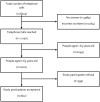Perceptions, knowledge and attitudes about COVID-19 vaccine hesitancy in older Portuguese adults
- PMID: 35258520
- PMCID: PMC8992312
- DOI: 10.1093/ageing/afac013
Perceptions, knowledge and attitudes about COVID-19 vaccine hesitancy in older Portuguese adults
Abstract
Background: Coronavirus 2019 (COVID-19) has become a public-health emergency of international concern. Most efforts to contain the spread and transmission of the virus rely on campaigns and interventions targeted to reduce Vaccine Hesitancy and Refusal (VHR).
Objective: this study aims to assess the major factors associated with VHR in the older population in Portugal.
Methods: a nation-wide cross-sectional study was conducted in the older Portuguese population (≥65 years old) through computer-assisted telephone interviewing. Logistic regression was used to determine the adjusted odds ratio (OR) of the independent variables (perceptions, knowledge and attitudes) and of the outcome (VHR).
Results: the response rate was 60.1% (602/1,001). Perceptions, knowledge and attitudes were strongly associated with VHR probability. A 1-point Likert scale increase in concerns about the vaccines' efficacy and safety increased the risk of VHR by 1.96 (95% confidence interval [CI]: 1.40-6.28) and 3.13 (95%CI: 2.08-8.22), respectively. A reduction of VHR probability for 'reliability of the information released by social media' (OR = 0.34, 95%CI: 0.16-0.70) and for 'trust in national and international competent authorities' (OR = 0.34, 95%CI: 0.17-0.69) is also observed per 1-point increase.
Conclusions: as VHR seems to be strongly associated with perceptions, knowledge and attitudes, the design and promotion of vaccination campaigns/educational interventions specifically targeted at changing these potentially modifiable determinants may help to tackle COVID-19 VHR and achieve a wider vaccine coverage.
Keywords: COVID-19; Portugal; hesitancy; older adults; older people; vaccination.
© The Author(s) 2022. Published by Oxford University Press on behalf of the British Geriatrics Society. All rights reserved. For permissions, please email: journals.permissions@oup.com.
Figures
References
-
- World Health Organization . Ten Threats to Global Health in 2019. World Health Organization, 2021.
Publication types
MeSH terms
Substances
LinkOut - more resources
Full Text Sources
Medical



